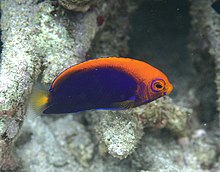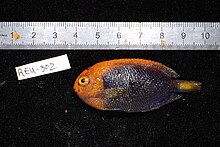| Orangeback angelfish | |
|---|---|

| |
| A live individual. | |

| |
| A dead specimen. | |
| Conservation status | |
 Least Concern (IUCN 3.1) | |
| Scientific classification | |
| Domain: | Eukaryota |
| Kingdom: | Animalia |
| Phylum: | Chordata |
| Class: | Actinopterygii |
| Order: | Acanthuriformes |
| Family: | Pomacanthidae |
| Genus: | Centropyge |
| Species: | C. acanthops |
| Binomial name | |
| Centropyge acanthops (Norman, 1922) | |
| Synonyms | |
| |
The orangeback angelfish (Centropyge acanthops), also known as the flameback angelfish, African pygmy angelfish and in South Africa as the Jumping Bean or Bean, is a species of ray-finned fish, a marine angelfish belonging to the family Pomacanthidae. It is found in the western Indian Ocean.
Description
The orangeback angelfish has the head, upper flanks, the dorsal fin and the caudal fin are golden yellow in colour. The lower flanks and the anal fin are black with many dense purple spots. Their eyes are ringed with blue. This species attains a maximum total length of 8 centimetres (3.1 in).
Distribution
The orangeback angelfish is found in the western Indian Ocean. It occurs along the East African coast from Somalia south to East London in the Eastern Cape Province, as well as Madagascar, Seychelles, Comoros, the Chagos Islands and the Mascarene Islands. In Asia it has been recorded from the Gulf of Aden and the Arabian Sea off Yemen, including Socotra, and Oman as well as the Maldives. It has also been recorded from the Australian territory of the Cocos (Keeling) Islands.
Habitat and biology
The orangeback angelfish is found at depths between 1 and 70 metres (3.3 and 229.7 ft), usually near coral and frequently in area of coral rubble where it likes to hide among the rubble. It prefers areas with dense algal growth and it grazes on algae and small invertebrates. It is a social species which is typically encountered in groups of up to 10 fishes. They are protogynous hermaphrodites in which the most dominant female in a group becomes male, this can be reversed if the dominance is lost. This species spawns at dusk, the male bites the females on the abdomen to stimulate her to lay eggs he fertilises and the eggs are then left to drift on the current.
Systematics
The orangeback angelfish was first formally described as Holacanthus acanthops in 1922 by the English ichthyologist John Roxborough Norman (1898-1944) with the type locality given as Durban. In some classifications it is placed in the subgenus Xiphipops. The specific name acanthops is a compound of acanthus meaning “spine” and ops meaning “eye” and is a reference to the rearward directed spine under the eye.
Utilisation
The orangeback angelfish is common and popular in the aquarium trade. It has been bred in captivity.
References
- ^ Fricke, R. (2010). "Centropyge acanthops". IUCN Red List of Threatened Species. 2010: e.T155083A4694588. doi:10.2305/IUCN.UK.2010-4.RLTS.T155083A4694588.en. Retrieved 19 November 2021.
- "Centropyge acanthops". WoRMS. World Register of Marine Species. 2012. Retrieved December 9, 2012.
- ^ Froese, Rainer; Pauly, Daniel (eds.). "Centropyge acanthops". FishBase. December 2019 version.
- "Centropyge acanthops". Saltcorner!. Bob Goemans. 2012. Retrieved 14 January 2021.
- Dianne J. Bray. "Centropyge acanthops". Fishes of Australia. Museums Victoria. Retrieved 16 January 2021.
- Eschmeyer, William N.; Fricke, Ron & van der Laan, Richard (eds.). "Species in the genus Centropyge". Catalog of Fishes. California Academy of Sciences. Retrieved 16 January 2021.
- Christopher Scharpf & Kenneth J. Lazara (21 July 2020). "Order ACANTHURIFORMES (part 1): Families LOBOTIDAE, POMACANTHIDAE, DREPANEIDAE and CHAETODONTIDAE". The ETYFish Project Fish Name Etymology Database. Christopher Scharpf and Kenneth J. Lazara. Retrieved 16 January 2021.
- Jake Adams (21 April 2020). "African Flameback Now Being Cultured by ORA". reefbuilders.com. Retrieved 16 January 2021.
- "Centropyge". Integrated Taxonomic Information System. Retrieved 6 June 2006.
External links
| Taxon identifiers | |
|---|---|
| Centropyge acanthops | |
| Holacanthus acanthops | |